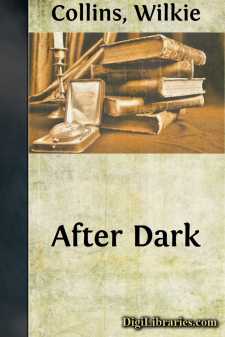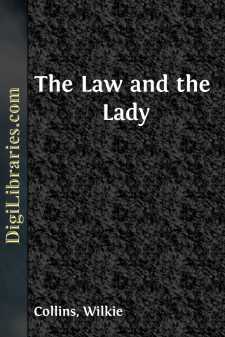Categories
- Antiques & Collectibles 13
- Architecture 36
- Art 48
- Bibles 22
- Biography & Autobiography 813
- Body, Mind & Spirit 142
- Business & Economics 28
- Children's Books 17
- Children's Fiction 14
- Computers 4
- Cooking 94
- Crafts & Hobbies 4
- Drama 346
- Education 46
- Family & Relationships 57
- Fiction 11829
- Games 19
- Gardening 17
- Health & Fitness 34
- History 1377
- House & Home 1
- Humor 147
- Juvenile Fiction 1873
- Juvenile Nonfiction 202
- Language Arts & Disciplines 88
- Law 16
- Literary Collections 686
- Literary Criticism 179
- Mathematics 13
- Medical 41
- Music 40
- Nature 179
- Non-Classifiable 1768
- Performing Arts 7
- Periodicals 1453
- Philosophy 64
- Photography 2
- Poetry 896
- Political Science 203
- Psychology 42
- Reference 154
- Religion 513
- Science 126
- Self-Help 84
- Social Science 81
- Sports & Recreation 34
- Study Aids 3
- Technology & Engineering 59
- Transportation 23
- Travel 463
- True Crime 29
Sort by:
by:
Wilkie Collins
I visited Cornwall, for the first time, in the summer and autumn of 1850; and in the winter of the same year, I wrote this book. At that time, the title attached to these pages was strictly descriptive of the state of the county, when my companion and I walked through it. But when, little more than a year afterwards, a second edition of this volume was called for, the all-conquering railway had invaded...
more...
by:
Wilkie Collins
Chapter 1. The date is between twenty and thirty years ago. The place is an English sea-port. The time is night. And the business of the moment is—dancing. The Mayor and Corporation of the town are giving a grand ball, in celebration of the departure of an Arctic expedition from their port. The ships of the expedition are two in number—the Wanderer and the Sea-mew. They are to sail (in search of...
more...
by:
Wilkie Collins
CHAPTER I. "Well, Monsieur Guillaume, what is the news this evening?" "None that I know of, Monsieur Justin, except that Mademoiselle Rose is to be married to-morrow." "Much obliged, my respectable old friend, for so interesting and unexpected a reply to my question. Considering that I am the valet of Monsieur Danville, who plays the distinguished part of bridegroom in the little...
more...
by:
Wilkie Collins
Part the First.THE VILLA AT HAMPSTEAD.I.ON a summer's morning, between thirty and forty years ago, two girls were crying bitterly in the cabin of an East Indian passenger ship, bound outward, from Gravesend to Bombay. They were both of the same age—eighteen. They had both, from childhood upward, been close and dear friends at the same school. They were now parting for the first time—and...
more...
by:
Wilkie Collins
CHAPTER THE FIRST You are here invited to read the story of an Event which occurred in an out-of-the-way corner of England, some years since. The persons principally concerned in the Event are:—a blind girl; two (twin) brothers; a skilled surgeon; and a curious foreign woman. I am the curious foreign woman. And I take it on myself—for reasons which will presently appear—to tell the story. So far...
more...
by:
Wilkie Collins
CHAPTER I. THE hands on the hall-clock pointed to half-past six in the morning. The house was a country residence in West Somersetshire, called Combe-Raven. The day was the fourth of March, and the year was eighteen hundred and forty-six. No sounds but the steady ticking of the clock, and the lumpish snoring of a large dog stretched on a mat outside the dining-room door, disturbed the mysterious...
more...
by:
Wilkie Collins
A LODGING FOR THE NIGHT, By Robert Louis Stevenson It was late in November, 1456. The snow fell over Paris with rigorous, relentless persistence; sometimes the wind made a sally and scattered it in flying vortices; sometimes there was a lull, and flake after flake descended out of the black night air, silent, circuitous, interminable. To poor people, looking up under moist eyebrows, it seemed a wonder...
more...
by:
Wilkie Collins
CHAPTER I. GREENWATER BROAD LOOK back, my memory, through the dim labyrinth of the past, through the mingling joys and sorrows of twenty years. Rise again, my boyhood's days, by the winding green shores of the little lake. Come to me once more, my child-love, in the innocent beauty of your first ten years of life. Let us live again, my angel, as we lived in our first paradise, before sin and...
more...
by:
Wilkie Collins
CHAPTER 1. The mountains forming the range of Alps which border on the north-eastern confines of Italy, were, in the autumn of the year 408, already furrowed in numerous directions by the tracks of the invading forces of those northern nations generally comprised under the appellation of Goths. In some places these tracks were denoted on either side by fallen trees, and occasionally assumed, when half...
more...
by:
Wilkie Collins
CHAPTER I. THE BRIDE'S MISTAKE. "FOR after this manner in the old time the holy women also who trusted in God adorned themselves, being in subjection unto their own husbands; even as Sarah obeyed Abraham, calling him lord; whose daughters ye are as long as ye do well, and are not afraid with any amazement." Concluding the Marriage Service of the Church of England in those well-known words,...
more...











